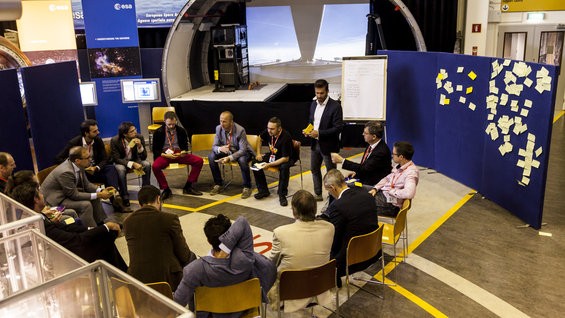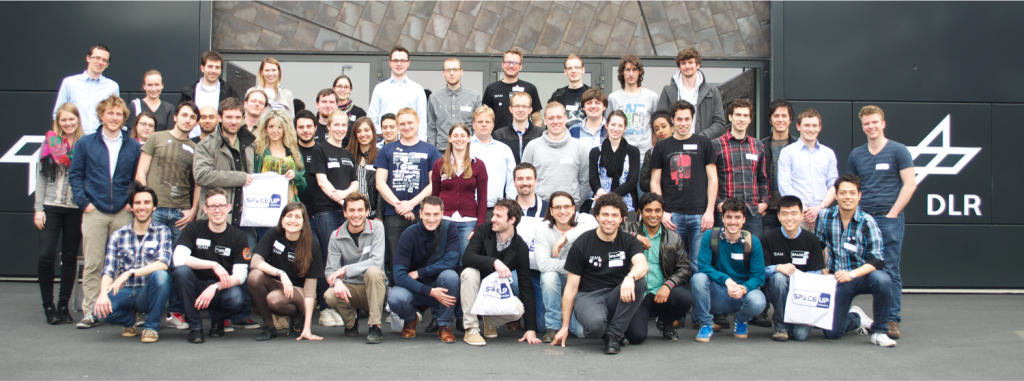Do angels invest in space? Increasingly more. The space technology is not as expensive and unreachable as was common to assume. Here is your intro to the current state of European space technology and investment.
Why does space matter?
Space technology is not just about billion dollar launchers, terraforming on Mars and colonizing the Moon. Space matters because it is the key to enabling every form of modern communication, now and into the future:
“Today, there has never been a greater need for connectivity, interconnectivity and interactivity, ” says Candace Johnson, EBAN Space Board Member and EBAN President Emeritus.

The reason for that is the Internet of Things (IoT), a movement towards sensors in and on every item in our lives, from industrial equipment such as weather monitors and medical equipment, home appliances such as fridges and washing machines all the way to infrastructure items like bridges, trees and pipelines, and even to living creatures like animals, pets, and yes, even humans.
Putting IoT sensors everywhere is only the first step. Next is connecting them to computers and gathering, reading and analyzing the big data they generate. Basically, IoT and space technology is very relevant to obtaining data for improving our lives on Earth.
“Connected IoT records what we can call the pulse of our planet. All the big data that we gather, look at and analyze can enable more informed decisions that will hopefully lead to creating a better world. The only way to do this is with satellites. It is impossible to put fibre optic everywhere, but it is possible to put satellites everywhere.”
-Candace Johnson, EBAN Space Board Member and EBAN President Emeritus
Isn’t space way too expensive for angel investors?
It used to take $200-300 million just to get one satellite up in space. Now, a startup founded by 3 ex-NASA employees Planet Labs owns over 200 satellites in the orbit, with the same $200 million funding, making it the largest satellite fleet to date. How? With miniature nanosatellites. Each satellite is only 25cm long and contains a smartphone taking photos of the Earth every day.
Dove satellite. Source: Planet Labs
An angel may not have $200 million but certainly can put together a syndicate with other business angels and private investors to fund space entrepreneurs. Stephan Reckie from Angelus Funding notes that a $50-100k investment can already make a difference. With nanosatellites anyone can launch a small prototype into space now – space is no longer a monopoly for the big few – it is now really open to everybody.
“Miniaturisation of components means democratization of space. But even before, when most people were doing industrial and government program, I have always only done commercially-oriented privately financed market-oriented space. SES, Iridium, ILS, — all of these are privately financed, commercial and market-oriented ventures who were founded as entrepreneurial start-ups and continue to make money today.”
-Candace Johnson, EBAN Space Board Member and EBAN President Emeritus
Kacifid/OWNSAT (Ocenaia Women’s Network Satellite), one of Candace’s satellite systems, provides high-speed broadband connection by renting out satellite space to the smaller island nations in Pacifics who do not have their own satellites. Starting from market need and building a profitable business is possible in space just like in any other industry.
Who are the new space founders?
The democratization of space has caught the eye of established entrepreneurs like Richard Branson, Jeff Bezos and Elon Musk. With Virgin Galactic, Blue Origin and SpaceX, new space technology has been getting more positive attention in the media. An increasing number os aspiring astropreneurs are looking at their stories and thinking: “If they can do it, maybe, so can I!”
“The founders are still geeky. It feels much like the first years of the internet, people who are in it actually, deeply and passionately care about space and understand the underlying technology.”
-Stephan Reckie, Co-founding managing member, Angelus Funding

Space founders are still more on the tech and less on the business side, though successful teams always cover both. One of the co-founders may be more technically-minded and take the CTO role, however, all founding team members in a successful space startup should understand and be on the same page regarding business model and priorities.
“I see more of technically advanced engineer-background founders. There are also young students with keen interest in space technology who have become experts in a very short time through self-study. They are really really interested and are spending all their time doing different things related to space, are very curious and work very hard.”
-Ivo Remmelg, serial entrepreneur, EstBAN angel and ESA Incubator mentor
It’s not all men either. Candace Johnson has been in commercial spacetech for decades, building multiple satellite businesses, contributing towards demonopolization of the industry and connecting stakeholders across continents, especially women. There are female astropreneurs in Russia, Singapore, India, Oceania and beyond working hard and even more females working in space agencies and corporations.
“When you add value and are good at what you do, the barriers we hear of so often don’t matter as much. There are successful women in space technology, and when I have a chance to hire them, I do. Not because I am driving some affirmative action or follow some reverse bias. I do because most of them are in the industry against the norm, because they actually care. When given responsibility, they are committed, hardworking, smart and not entitled.”
-Candace Johnson, an astaroprenur and angel investor in spacetech
How can angels find the best startup teams?
Space is not that much different from other industries: the same screening criteria apply. Yes, you assess the business model and market opportunity, but ultimately you invest in the team and its ability to execute the vision.
“My favourite thing about angel investing is the people, both founders and investors. I love spending time with hardworking millennials, learning from them and helping them. Yes, I invest for potential financial return but I mostly enjoy the time spent together, helping the founders build their business, raise more funding and become profitable or exit.”
-Peter Cowley, entrepreneur, angel investor and President of EBAN

For that, you ideally look for:
- A reliable founding team of 2-3 people with complementary skillsets (technology, sales and execution) and strong work ethic;
- Personal motivation, strong qualities of passion, drive and persistence;
- Coachable, great listeners – to their team, partners, investors, and, most importantly – customers;
- Intense ambition to scale;
- Ability to plan, discard the plan and re-plan (pivot);
- Believable market research, especially CAC (customer acquisition cost) and LTV (customer’s lifetime value);
- Honest, transparent, reliable with their word;
- Fun to work and socialize with (you’ll spend lots of time together, anything else is not worth it).
The unicorn concept is dangerous. Pushing founders to take disproportionate risks instead of building solid business growth is overrated. This should be discussed early on, both investors and founders should have an understanding on what they are after.
Follow-up rounds are souce of cash and reputation. A responsible angel investor should have 2-3x more than initial investment ready for follow-on rounds. It is also important to be transparent if you don’t. A lead investor who is not following on in the next round can notably affect the startup’s chances to raise more funding.
Changes in the team early on are a reason to investigate. You want to make sure the founders are clear on what they want and are committed to building the business for years to come. Changes later on as the company grows are not necessarily negative: it takes a different kind of skillset to start a business and to hire and manage its 200th employee. A founder who recognizes that and hires a professional CEO is actually a good sign.
What should startups consider before taking angel funding?
Angel investors often provide value beyond financial contribution. If you find the right match, your relationship with a business angel can bring access to follow-on financing, introductions to mentors and investors, as well as business and sometimes even technical advice. Some specialized investors and mentors such as those at ESA Business Incubation Services also provide guidance regarding local suppliers, components and links to pilot partners and potential customers.
“Angels are angels because we give more than money. We prefer to get involved in smart money deals where our contribution extends beyond just the dollars. Of course, we also invest in companies who are smart themselves and can use our funds well.”
-Stephan Reckie,Co-founding managing member, Angelus Funding

Not every angel investor is a good fit for your startup, though. Founders are often so focused on getting their business off the ground that due diligence on potential investors takes secondary priority. It is very important, though, as a poor choice of initial investors may notably complicate follow-up funding and consequently – the growth of the company.
Below are some questions to ask your potential angel investor, from Peter Cowley’s book “The Invested Investor”:
- Take references from previously backed entrepreneurs: what was investor’s involvement and contribution to their business?
- How much time does the investor have to help your particular company?
- How much more money, do you think we need? Can and will you personally follow on?
- Can you connect us for follow-on funding?
- What other investments do you have in our space?
- How else can you help us?
Cash is your lifeline, but be smart about it. There are many experienced angels in your industry, the important part is finding them. Don’t just chase the highest valuation. For space technologies, look at ESA and Space accelerators, aiming for a good mentor network that wants to work with you and provide honest feedback and input to grow your business. Do not list mentors that will may sound good but will not be active.
Where do I start?
You do not necessarily need a background in space to be a successful space investor or founder. You do need relevant experience or reasonable understanding of what you are trying to do. That can come from a surprisingly broad range of related industries, though. Many space angels and founders come from telecommunications, software development, life sciences, agriculture, sustainability, robotics, big data, material science, optical sensor, big data and many more backgrounds. Space enables everyday services like GPS, Uber and airBNB, it is much broader than rocket science.
If you have interest and experience, national space agencies and big industry players are increasingly interested in working with innovative space startups and investors. NASA officially opened applications for its First Space Accelerator this year. ESA has an entire research, project development, networking and prototyping infrastructure set up for space founders and investors, with 20 business incubation centres across the EU and a whole venture arm NOT taking any equity for their help.
Another big aspect of space investment is software. For example, writing apps to do manipulation of EU’s Copernicus satellite data via Copernicus Masters Program, an ESA initiative providing startup teams with access to Copernicus’s data to solve real challenges from real industry and government players.
EBAN is also working closely with ESA to help angels get involved and capitalize on the new spacetech opportunities. They just held a dedicated Space Academy at EBAN Congress 2019 in Helsinki, and are happy to help aspiring space angels and startups figure out their next step. You can also reach out to EBAN and contact ESA for more information on space startups and investments.





